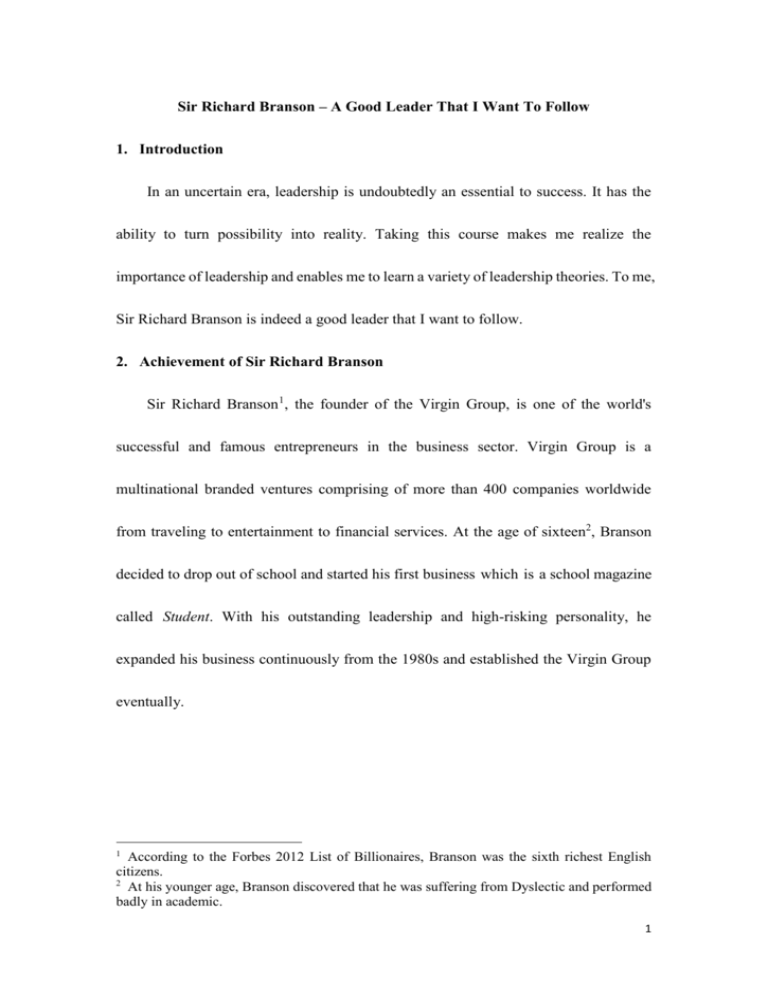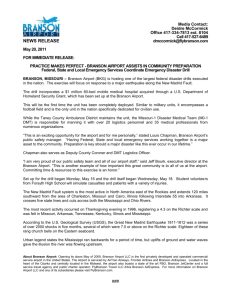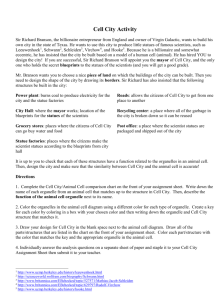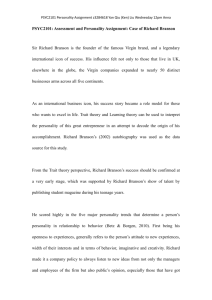individualtermpaper
advertisement

Sir Richard Branson – A Good Leader That I Want To Follow 1. Introduction In an uncertain era, leadership is undoubtedly an essential to success. It has the ability to turn possibility into reality. Taking this course makes me realize the importance of leadership and enables me to learn a variety of leadership theories. To me, Sir Richard Branson is indeed a good leader that I want to follow. 2. Achievement of Sir Richard Branson Sir Richard Branson1, the founder of the Virgin Group, is one of the world's successful and famous entrepreneurs in the business sector. Virgin Group is a multinational branded ventures comprising of more than 400 companies worldwide from traveling to entertainment to financial services. At the age of sixteen2, Branson decided to drop out of school and started his first business which is a school magazine called Student. With his outstanding leadership and high-risking personality, he expanded his business continuously from the 1980s and established the Virgin Group eventually. 1 According to the Forbes 2012 List of Billionaires, Branson was the sixth richest English citizens. 2 At his younger age, Branson discovered that he was suffering from Dyslectic and performed badly in academic. 1 3. Leadership with Authority From an establisher of the school magazine to the chairperson of the Virgin Group, Branson demonstrated the leadership with authority. Making use of his formal title, he has the power to make a decision of creating a fun workplace environment in order to motivate his followers to achieve the goals. 4. Exemplification of a Consensus Builder Consensus building is essential for the development of teamwork, commitment and motivation. A good consensus builder involves and empowers his employees, and creates a positive working environment for them. Being a consensus builder, Branson has done a great job. First, he is very insisted in creating a fun working atmosphere for his employees. Instead of just working for earning a living, his employees commit themselves to Virgin as the fun working atmosphere makes them enjoy working. Second, he places the communication among people of any levels to a high position. Branson always carries a notebook with him to jot down any interesting ideas and opinions heard from his employees (Abir, 2014). Also, he sends a letter to his employees monthly to talk about the coming plans of Virgin (Leadership Resource Group, 2014). Along with the letter, his home address and phone number are provided so as to let his employees to share their brilliant ideas, suggestions or even problems with him. Interesting goals are hence set via the communication with employees. By 2 creating harmony in the workplace and establishing relationships with employees, conflicts raised can be reduced and consensus can be built ultimately. 5. Measurement of Success Unlike others, Branson believed that happiness is the best measurement of success rather than the gross profit generated 3 (Branson, 2012). When the employees are happy, they will enjoy working and committing themselves to the company, and eventually bring about success. Therefore, Branson focuses on creating a relax workplace to make his employees happy. 6. Implementation of Adaptive Solutions Being the chairman of the Virgin Group, Branson faces challenges day by day. In running a multinational brand, problems encountered are usually without straightforward solutions. Instead, adaptive challenges are commonly seen. Branson is good at implementing adaptive solutions, which reflects his leadership ability. Take the establishment of the Virgin Atlantic as a typical example, Branson faced a load of challenges in establishing his airline business. In order to step into the British airline market, Virgin was required to gain the government certification flight which was dependent on the fully functional airplane in order to take out insurance Walenius, He expressed his view on success in his blog: ‘Success and money can contribute to happiness, but happiness itself is another thing altogether. Words like family, friends, love and laughter have a lot more to do with happiness than words like gross, capital and revenue.’ (Branson, 2012). 3 3 2011). Unexpectedly, birds flew into the engine, which leaded to explosion. Such explosion would definitely cause a setback. Worse, the repair cost of engine was very high. Branson soon changed his plan and pulled cash from overseas to fix the crunch, and later carried out a series of financial restructuring strategies and found new banking backup. From the above case, it is clear that Branson shows his leadership by implementing the adaptive solutions successfully. 7. Exemplification of Leadership Theory Being a successful leader, Branson exemplifies a variety of leadership theories. In the following, a detailed discussion will be given. 7.1.The Great Man Theory Despite his effort, Branson was born to be a leader. Branson’s father was a barrister while his grandfather was a Privy Councilor and a judge of the High Court of Justice. His leadership ability and traits are inherited from his family members. 7.2.The Traits Theory Outstanding leaders are usually associated with a load of personality traits which are different from the followers, let alone Branson. Although Branson is suffered from Dyslexic, he is undoubtedly an intelligent leader. Because of suffering from Dyslexic, Branson needed to pay more hard-work than others in order to get a pass. Seeking ways to make tasks easier fully reflects his 4 intelligence. Dyslexic is a unique gift to Branson as it makes him become more confident through the process of overcoming the deficiency disease (Walenius, 2011). Throughout his career life, he faced numerous failures and criticisms, but he never let himself down and always fights back. Moreover, he shows a high level of determination and persistence. Failures are inevitable in running a business. However, Branson is able to bounce back and learn from the mistakes. He started his business at the age of sixteen and expanded his business continuously, which surprised others with his determination and courage. In order to lead a multinational brand, integrity is with utmost importance. It is necessary to let your customers, business partners and followers to believe in you in order to gain support from them. From his success, he shows his honesty, trustworthiness and dependability. Last but not least, Branson is a sociable person as well. He is outgoing and sensitive to others’ needs, which is shown from the establishment of the Virgin Atlantic. The reason why he chose to start an airline business is mainly because he noticed that the recent airline services were too expensive and not suited the needs of the customers well at that time (Leadership Resource Group, 2014). 5 7.3.The Style Theory Branson is enthusiastic about communicating with people from superiors to peers to subordinates. ‘You can’t be a good leader if you don’t genuinely like people’ said by Richard Branson. Branson is a people-oriented leader and cares for his followers in-depth. He believes that every employee holds a stake in the success of a brand (Walenius, 2011). When the employees work happily and enjoy their work, they will give their best shoot to the company as well as commitment. Therefore, Branson always maintains a connection with his employees via discussing business decisions and future plans of the company with them. He also leaves his personal contact for the employees so as to keep them updated with the present situation of the company. Regardless of the positions of the employees, Branson is so open-minded that he is willing to hear any comments from them and will take their ideas if he considers the ideas are fun and innovative. He often has party with his employees to have another type of special interaction with them (Walenius, 2011). Without doubt, he believes that such interaction with the followers can motivate them on one hand and gain respect on the other hand. From the above examples, Branson concerns for the people and demonstrate the Style Theory in his leadership. 6 7.4.The Situational and Contingency Theory Branson spent plenty of time on enhancing the performance of his employees by providing training and motivation to them, so as to control over the outcomes and work hard to achieve the goal on an organizational level rather than a personal level. Branson treats his employees as his family members (Abir, 2014). For example, Branson invited some of his employees to his home to have parties. He believed that there is no single fixed way to get things done. So he empowers his employees the freedom and initiative to be innovative. Branson always looks for new opportunities to make Virgin more vibrant and fun, and deals with challenges promptly. Cite taking up joint ventures and partnerships as an example, Branson is high-risk taker and willing to try. Such willingness and trial enables Virgin to enter the complex market without unnecessary additional cost (Abir, 2014). 7.5.The Transformational Theory Branson is being regarded as a transformational leader4 instead of a transactional leader5. In the Virgin Group, the bonding between the employees and the company is very tight. Branson creates a free culture with an open approach in the Virgin Group to enable the flow of creative and innovative ideas. With his unique way in treating 4 A transformational leader sets up a business culture with core values of charisma and collective vision of placing the company goal beyond the personal one. 5 A transactional leader focuses on rewards and punishments to motivate employees to work towards the goals. 7 employees, Branson makes the employees work in an enjoyable working environment like home. Cite the Virgin Bride as a key example, the internal idea generated by employee is eventually turned out to be a Virgin business venture. Branson made good use of a Virgin Atlantic employee’s marketing strategy to run the Virgin Bride which was considered as an under-satisfied market (Walenius, 2011). Rather than rewarding or penalizing, Branson is able to create a common vision so as to let his employees to put the organization goal ahead the personal one. 8. Demonstration of Self-awareness and Empathy For self-awareness, Branson makes good use of his appearance to create a sense of informality. He has a long hair and beard, and always dresses in a casual way to convey a message that informality and flexibility are the core values of Virgin. Furthermore, Branson demonstrates empathy in the management of Virgin. Branson runs his business with a deep sense of empathy. He believes that hiring the right person and building him up to take up the suitable responsibility are better than hiring a wrong person and tearing him down. Therefore, firing is not common in his company. Take his performance in the reality show, The Rebel Billionaire, as an example; he burst into tears when he was required to fire the contestants. He admitted that he had built up a relationship with the contestants in two weeks (Yeomanson, 2014). He can show such a deep sense of empathy to the contestants who had just 8 spent two weeks with him, let alone his employees. In Virgin, every employee pays a contribution to the success of Virgin since Branson is very down-to-earth and open to hear ideas from employees. Such deep sense of empathy enables Branson to manage his company well as every employee is willing to commit themselves to Virgin. 9. Conclusion After having a thorough analysis of the leadership skills possessed by Richard Branson, it is high time I learn from him. Branson is always being regarded as a passionate leader. He puts fun on a very high priority in deciding what to do. Having fun is a typical thing that I should learn from him. When I consider a thing which is fun to do, I will become more enthusiastic and be more willing to commit myself to the work. Doing things on which I am interested makes me willing to spend time on and actively participate in them. In this way, followers are easier to be convinced, inspired and encouraged to take the same action as me. As a result, both the followers and I can work hand in hand to achieve our common goals, work will then become more efficient and effective. Apart from the attitude of having fun, the people-oriented value is another unique leadership that I want to learn from Branson. Branson is a friendly and outgoing person who loves communicating with people. He places importance on the relationship between the leader and the followers. It is true that maintaining a close 9 relationship with the followers can have a detailed understanding on their needs, ideas and problems encountered. With continuous communication with the followers, work can go on more smoothly as consensus is built between us. Both the leader and followers are beneficial as the followers can be motivated while the leader can be respected. To conclude, undoubtedly, Sir Richard Branson is a good leader that I want to follow. (1996 words) 10 Bibliography Abir, Z. T. (2014). Analysis of Entrepreneurial Cases: Compare & Contrast Ted Turner & Richard Branson. Retrieved Month Date, from Leadership Resource Group, Web site: http://www.academia.edu/2584466/Analysis_of_Entrepreneurial_Cases_Ted_Tur ner_iii_and_Sir_Richard_Branson Branson, R. (2012). What’s the best measurement for success? Happiness. Retrieved April 15, 2014 from http://www.linkedin.com/today/post/article/20121109141247-204068115-what-sthe-best-measurement-for-success-happiness Leadership Resource Group (2014). Successful Leadership - Sir Richard Branson, Retrieved April 15, 2014 from Leadership Resource Group, Web site: http://adedass.tripod.com/id4.html Walenius, M. (2011). The Leadership Style of Sir Richard Branson. Retrieved April 15, 2014 from http://michael.walenius.se/the-leadership-style-of-sir-richard-branson/ Yeomanson, J. (2014). Billion Dollar Empathy: Branson Style. Retrieved April 15, 2014 from http://www.compdance.com/yeomanson_article.shtml 11




